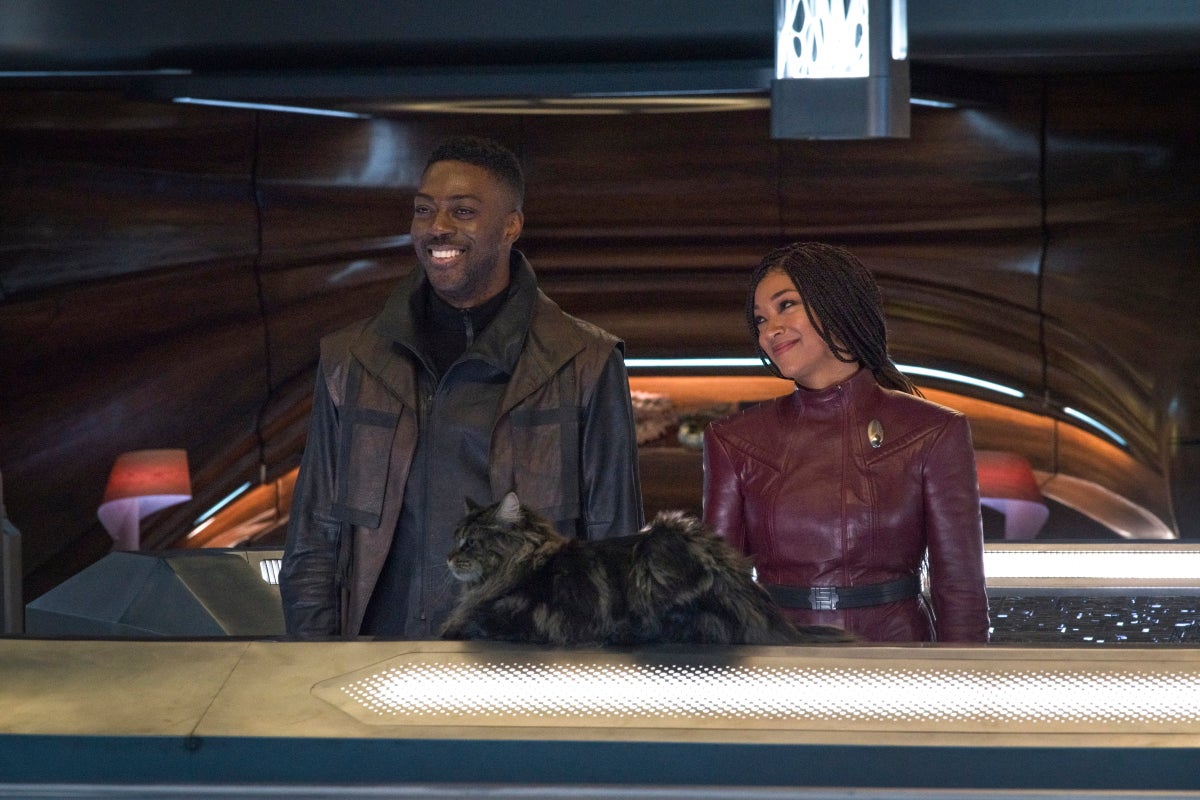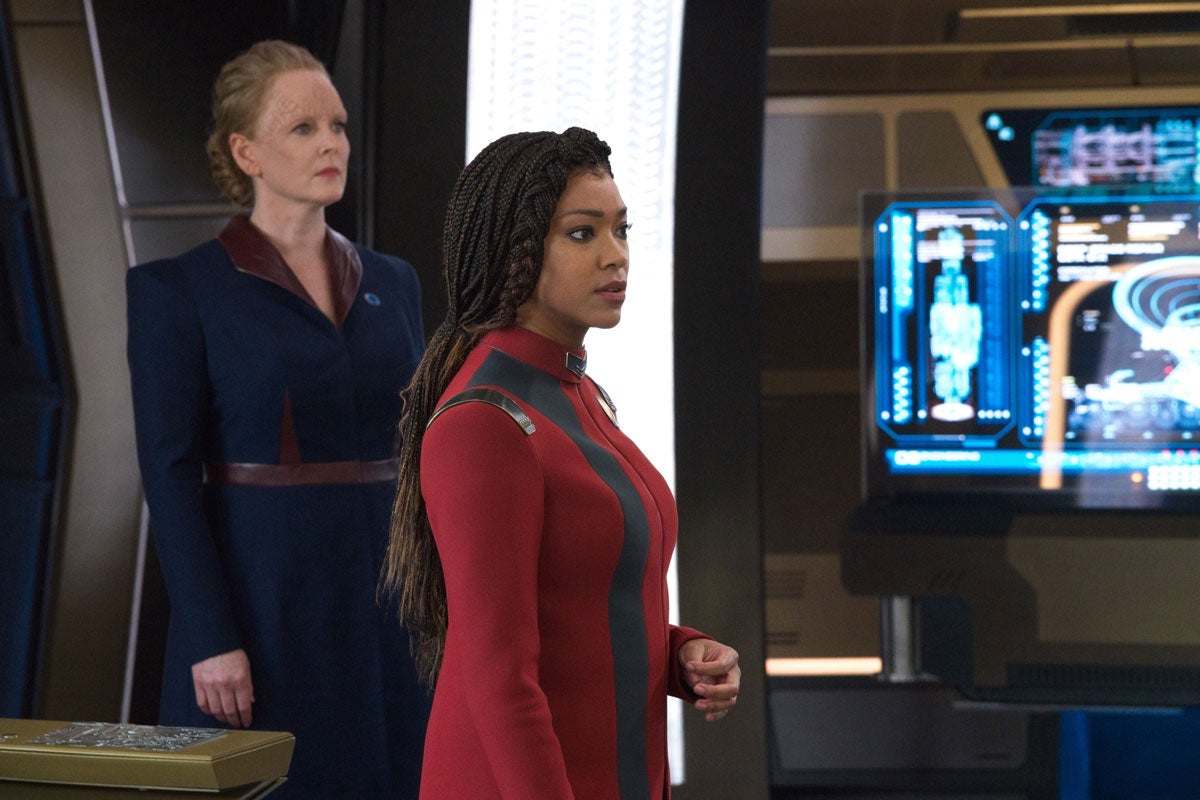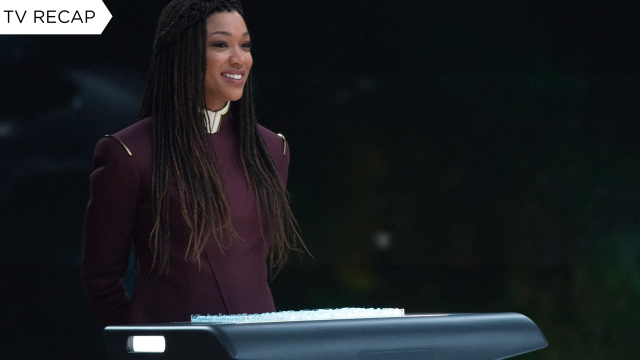Star Trek’s legacy is built on heroes doing the kinds of things that, really, they shouldn’t: captains beaming down on missions that could get them killed, reckless, brave officers who dare first and ask questions later. It’s always been an accepted part of the narrative; Star Trek’s leads, commanders, engineers, scientists, are heroes, and the heroes win. Discovery is no exception, but entering its new season, it seems to want to start grappling with what that really means.

It can be no more explicit in the fact that season four’s premiere is named for the iconic Starfleet Academy test, “Kobayashi Maru” — the nature of which sits at the heart of the moral dilemma Discovery’s latest season opens with. It’s primarily an episode of stage-setting for drama to come: we get to see how Starfleet and the Federation have dusted themselves off in the time since season three’s end, and how Captain Michael Burnham now leads the way for a renewed sense of hope and connection across the galaxy, delivering dilithium and promises of reconciliation (to sometimes not always peaceful effect). While Saru is back on Kaminar establishing relations with his people in an attempt to encourage them back into the galaxy at large, Michael is, unequivocally, a hero in ways she hasn’t been able to be without question in prior series.
After three seasons where she has been the main character and done the hero thing time and time again, albeit often to great challenge and frustration of the people around her, now she’s a hero in the Kirkian manner, perhaps appropriate for someone flung from the 23rd to 31st centuries. Her authority as Discovery’s captain means she can be that kind of swaggering, high-risk high-reward leader on the frontlines as he was, being chased by phaser fire in one moment, confidently sauntering onto the bridge — her bridge — the next. She and the Discovery have everything they’ve ever wanted: people they love, friends and found families by their side, boldly going where many have gone before but perhaps not with as much glee for how cool everything they do is.

So naturally, “Kobayashi Maru” has to come along and blunt that glee with all the subtlety of a brick, and remind our heroes just how hard-fought those cool adventures really are (like they don’t know already, but hey, your sci-fi show needs a big threat for the season!). On a macro scale, this comes in the arrival of the deadly, mysterious “anomaly,” a gravitational distortion that first strikes a long-range Federation outpost, and then more cataclysmically Book’s homeworld of Kwejian. Unrelenting, faceless, and seemingly as incomprehensible as it is unstoppable at this moment, the anomaly is something of a fascinating choice of foe for Discovery, a Trek series that has leaned heavily on more human threats, villains, and foes our heroes can talk to, negotiate and compromise with, and battle more physically. A spatial distortion doesn’t care who’s captain of what starship, it doesn’t care what planet you’re from, it just exists and leaves chaos in its wake. No matter how hard she tries time and time again in the premiere as the stakes become known to us, it is an opponent Michael and the Discovery crew can’t hero their way out against, a price they all pay dearly when they see Kwejian in ruins in its climax.
But it’s not the only way Michael’s heroism is challenged in the episode, nor is it the one that really evokes that no-win scenario test the episode is named for. That comes in the form of another new figure who is not quite so nebulous, and therefore much easier for Michael to butt heads with: the Federation’s president, Rillak (Chelah Horsdal), who finds herself tagging along when the Discovery is called by the distress beacon that leads them to the mysterious anomaly. Although Rillak’s obfuscation of whether she is there as friend or foe makes her less of a clear antagonist thus far, she is nonetheless the episode’s primary vessel for its critic of Michael’s leadership. This perspective is obvious when we meet her as we are told by Discovery that there must be something up with her, framed through the lens of Starfleet characters like Michael or the briefly returning Admiral Vance.
It is Rillak that invokes the Kobayashi Maru, after Michael decides to single-handedly get involved in a rescue mission aboard the damaged relay station, putting herself in danger above the needs of her own crew. The test, Rillak reminds Michael, isn’t to provide a sense of frustration in officers, that maybe they will be the hero, the daring Starfleet Academy graduate who will beat the infamous no-win scenario. It’s to roll with the dangerous punches that command brings, that there will not always be a chance to force the perfect outcome for every mission, and yes, sometimes there will be losses they could never have prevented. It’s an outcome, no matter how many times she has been unable to avoid it, that Michael is always willing to put herself in danger to attempt to prevent, as she does multiple times in this episode.

It’s an interesting ethical core for Discovery to put front and centre this season because it’s a question the show has tackled to varying degrees of strength before. Michael has always been a character, textually or otherwise, to be confronted with the critique that she is far too willing to put herself through reckless amounts of danger. Many times in past seasons, she and other characters have grappled with her need to be seen as the only person who can shoulder so many of the Discovery crew’s burdens, whether or not they’re beyond her position aboard the ship or a single person to bear. Time and time again, she’s sidestepped that critique by being a hero so hard that the universe had to yield to her will. It makes Michael a fascinating Star Trek hero, a human of sheer will and endurance that often puts her at loggerheads with authority figures around her and drags the rest of the crew along for the ride.
But it also means that, for all her points well argued this episode, Rillak and this critique is arguable being set up to fail, making it toothless the moment it becomes the focal point of “Kobayashi Maru.” Now Michael’s problem is that she is the authority figure. As Rillak constantly reminds her in this episode, a captain’s duty to their crew goes beyond personal circumstance. Michael, more than ever, has the lives of all of Discovery in her hands, as they prepare to face a crisis that is capable of wiping out planets in an instant.
Whether or not Discovery’s return to this question — if being a hero is as heroic as it really seems — will have some bite to it going forward remains to be seen. But regardless, an unstoppable force tearing its way across the galaxy is about to meet an immovable object in the form of Michael Burnham — and the mess that’s going to leave behind will no doubt make for some interesting fallout for this season to sift through.
